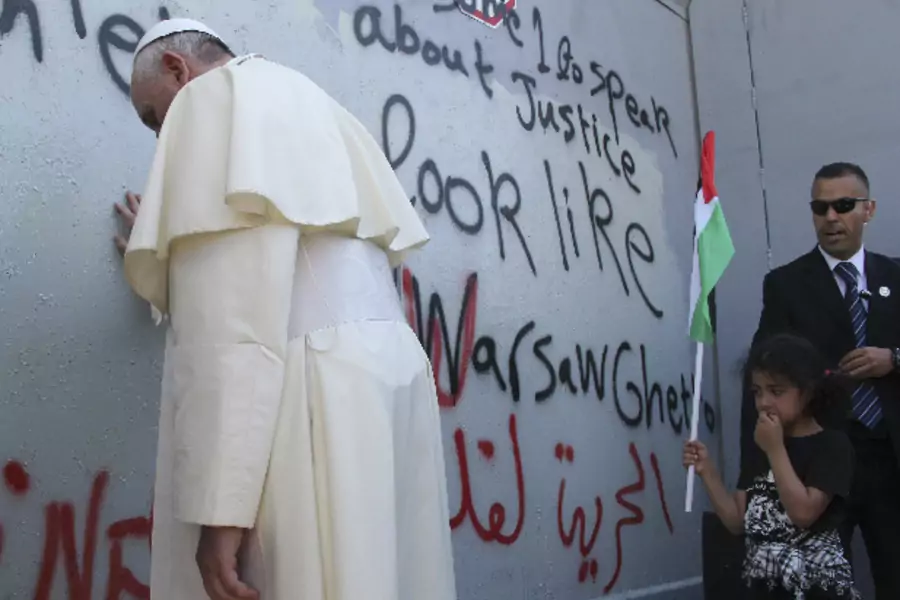This Week: Egyptians Vote, Libyans Demonstrate, and the Pope Visits the Holy Land

More on:
Significant Developments
Egypt. Security forces on Friday dispersed demonstrations across the country of Morsi supporters protesting General Abdel Fattah el-Sisi’s victory in this week’s presidential election. Sisi reportedly won nearly 95 percent of the vote. Presidential candidate Hamdeen Sabbahi, who came in third in 2012, conceded defeat yesterday, calling the official voter turnout figures an “insult to Egyptians’ intelligence.” The unofficial results show voter turnout at 46 percent, after the election was extended at the last minute to a third day to drum up participation. International observers cast doubt on the fairness of the elections; Eric Bjornlund, president of Democracy International, declared, “Egypt’s repressive political environment made a genuinely democratic presidential election impossible.” Lebanon’s former prime minister, Saad Hariri, congratulated Sisi saying that “Choosing you president for Egypt is a blessed step toward the restoration of Egypt’s leading role in the region and the Arab world.”
Libya. Libya’s political crisis continued this week, as thousands of people across Libya rallied to express support for renegade General Hiftar, who launched an offensive two weeks ago to purge the country of Islamist militias. On Tuesday, unidentified armed assailants attacked the home of Prime Minister Ahmed Maiteg, who was officially appointed on Monday by an Islamist-dominated parliament. Interim prime minister Abdullah al-Thinni requested a legal ruling on Wednesday on whether had to hand over power to Maiteg, who was elected on May 4 in a vote boycotted by many secular lawmakers.
Meanwhile, Mohammed al-Zahawi, the head of Ansar al-Sharia, issued a threat on Tuesday to “open the gates of hell on [Hiftar] and the region” in response to Hiftar’s crackdown in Benghazi. Following Zahawi’s threat, the State Department recommended all U.S. citizens leave Libya immediately. The same day, U.S. defense officials announced that the USS Bataan, with approximately one thousand Marines aboard, was moved into the Mediterranean to help with evacuations if necessary.
Jordan-Israel-Palestine. Pope Francis concluded a three-day trip to the Middle East on Monday, after visiting Jordan, Palestine, and Israel. The Pope left with a pledge from Israeli president Shimon Peres and Palestinian Authority president Mahmoud Abbas to join him to pray for peace in the Vatican on June 8. In an interview with PBS Newshour on Saturday, I discussed the Pope’s delicate balancing act in the region.
U.S. Foreign Policy
Obama. President Obama attempted to lay out a foreign policy vision in a speech at West Point on Wednesday, focusing on terrorism as the most direct threat to the United States for the foreseeable future. Obama said that it is necessary to develop a strategy to match the new threat of a decentralized al-Qaeda network. He also addressed Syria in the context of counterterrorism, calling it a “critical focus of this effort,” and declared that he will work with Congress to increase support for the Syrian opposition.
Israel-Palestine. Secretary of State John Kerry defended the Obama administration’s foreign policy in an interview with PBS Newshour, saying that “we are as engaged, more engaged than in any time in American history.” Speaking about the Israeli-Palestinian peace talks, Kerry acknowledged that he is disappointed that a deal wasn’t reached by his self-imposed April 29 deadline, but declared that, “my job is to push it forward and my job is to try to find the optimism and the possibilities, not to give up. And I refuse to give up.”
While We Were Looking Elsewhere
Syria. The UN Security Council is reportedly considering a draft resolution that would authorize aid deliveries into Syria at four points without government consent. UN deputy aid chief Kyung-wha Kang updated the UNSC yesterday on the status of the unanimously approved aid resolution that was passed in February, saying that it has failed to make a difference because nearly 90 percent of the aid goes to government-held areas. The new resolution was drafted by Australia, Luxembourg, and Jordan, and falls under the UN Charter’s Chapter VII, which would make it enforceable with military action.
Meanwhile, the first suicide bombing in Syria by an American citizen was reported on Tuesday. The man, known in Syria as Abu Huraira al-Amriki, carried out a truck bombing in the province of Idlib on Sunday. Intelligence officials say that about three thousand Westerners have traveled to Syria to fight, including nearly one hundred Americans.
Palestine. Palestinian Authority president Mahmoud Abbas asked Palestinian Authority prime minister Rami Hamdallah to form a new transitional government of independent technocrats yesterday. The new government aims to unite Fatah and Hamas under the terms of the unity pact they signed on April 23, and meet the five-week deadline for the formation of such a government. Palestinian officials say that they expect the new government to be announced within a few days, although disagreement reportedly remains over the candidate for the future foreign minister.
Iran-Saudi Arabia. Iran’s deputy foreign minister Iranian deputy foreign minister Hossein Amir Abdollahian Iranian deputy foreign minister Hossein Amir Abdollahian Iranian deputy foreign minister Hossein Amir Abdollahian welcomed yesterday an invitation from Saudi Arabia to attend next month’s meeting of foreign ministers of the Organization of Islamic Cooperation countries in Jeddah.
Tunisia. Gunmen killed four policemen in an attack on the home of Tunisian interior minister Lofti Ben Jeddou in Kasserine on Wednesday. Ben Jeddou was not at home during the attack, but responded the next day by saying that Tunisia is “still at war with terrorism and we should expect some losses.” No group has claimed responsibility yet, but the attackers are suspected to be Islamist militants.
More on:
 Online Store
Online Store